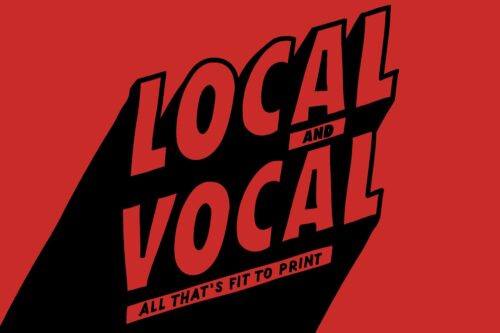
By Chris Cunningham
Bill remembers limping after injuring his left foot, but he certainly wasn’t thinking the worst. The pain continued, and he learned he had a broken toe, and to complicate matters, diabetes. PeaceHealth Riverbend quickly scheduled his surgery to amputate three toes.
The 55-year-old man had recently moved back to Oregon from Georgia, where he had been working part-time in a restaurant and caring for his elderly parents during COVID. He attributes his diabetes to the sugary soda pop he drank in large quantities at his workplace, but he figured it was a better alternative than the large amounts of alcohol on which he had become reliant.
When Bill returned to Eugene, he had nowhere to go and ended up living with an acquaintance. However, he didn’t want to burden him while he was recovering from surgery. So the social worker at Riverbend wrote a discharge plan for Bill to stay in a pallet shelter encampment at St. Vincent de Paul on Highway 99.
It’s hard to imagine being discharged from a hospital with nowhere to go, especially when our local social safety net for people who are homeless is fragile. ShelterCare recognized this gaping hole in the health care continuum in 2013 and ever since has been providing post-hospital recuperation to people who are medically fragile and unhoused.
While the temporary shelter was safer than the streets, Bill said maintaining a diabetic diet and caring for his surgical wounds was next to impossible. Once a chef, who prepared healthy vegetarian meals at venues like Breitenbush Hot Springs, Bill knew he needed to adopt a diabetic diet as well as dress his surgical wounds. But he didn’t have ready access to a kitchen and running water.
Because Bill was able to walk, bathe himself, administer his own medications and was eligible for the Oregon Health Plan, he was approved for a room at ShelterCare’s Medical Recuperation Program (SMR) on Hwy 99. Each unit has a shower and toilet, a small sitting area, and a microwave and refrigerator. ShelterCare’s 18-bed program is funded primarily by PacificSource and Trillium, both Coordinated Care Organizations for Oregon Health Plan consumers.
Located in a repurposed hotel in west Eugene, ShelterCare’s SMR program has since early 2023 provided Bill with a warm room, three cooked meals a day, transportation and case management to help him heal and eventually transition to permanent housing. A visiting nurse stops by to change the dressings on his foot. Bill hopes that access to all these services will strengthen him enough for future employment.
The SMR program staff have also helped Bill establish a relationship with a primary care physician. Bill’s fragile condition and acute medical needs have warranted a far longer stay than the average of 60 days, requiring his physician and insurance provider to approve extensions every month.
Scott Eastman, short-term housing manager at ShelterCare, says about 30 percent of SMR’s participants are on diabetic diets, the result of not having access to nourishing foods, health care and medicine. From May 2022 to May 2023, 49 percent of SMR participants had three or more concurrent medical conditions post-hospitalization, including mental health and chronic health issues, substance use disorders and physical disabilities.
SMR provides case management to facilitate longer-lasting solutions to its participants, including long-term housing. While such efforts don’t guarantee a perfect ending for everyone, some 68 percent of the program’s participants transition to more permanent housing arrangements. “We want to increase their options when they leave,” Eastman says.
“It’s taken a lot of time to fine-tune the process,” Eastman admits. But the care SMR has taken to create collaborative relationships with local hospitals and insurers has paid off. “Insurers love us because we provide care at a fraction of the cost of hospital care,” he says.
Eastman says there are hidden costs involved in not providing care to people who are unhoused and discharged from the hospital or emergency room. Without post-hospital care, many are readmitted to the hospital, make frequent visits to emergency departments, and have a shorter life expectancy, greater use of acute hospital services and higher mortality and morbidity.
Sadly, across the country, many hospitals do not have policies that adequately address post-discharge challenges for people who are unhoused. Research shows that most people who are homeless are discharged to emergency shelters or to the streets. With few options, it is difficult if not impossible to clean wounds, prevent infections, get restorative sleep, and eat nutritious meals.
Research published by the National Center for Biotechnology Information notes an increase in hospitalizations among the unhoused population. Although the reasons for the increase are not known, speculation suggests that an aging homeless population and a lack of access to preventive care may be two contributing factors.
Recent legislation in Oregon emerged following the death of a Salem woman who didn’t have a place to go after her discharge in winter 2022. Seeking a change in the current state system are three Oregon elected officials: Senators Deb Patterson and Kayse Jama, and Rep. Paul Evans, all Democrats. This year, the senators introduced Senate Bill 1076, which would require hospitals to have specific procedures for the discharge of homeless patients.
The bill received mixed support, Patterson writes, but a broad coalition supports another bill, SB 1079, that has established a Joint Task Force on Hospital Discharge Challenges to address the issues that hospitals face when trying to discharge patients to appropriate post-acute care settings. A broad coalition of stakeholders, including the Oregon Association of Hospitals and Health Associations, supports SB 1079, which has until Nov. 1, to submit administrative changes to the governor that do not require legislative actions.
In the meantime, SMR will do what it can to assuage the conditions for unhoused people, like Bill, who are leaving hospitals in Eugene/Springfield, and to provide an environment that lends itself to improved health outcomes and enhanced well-being. Bill grants that his extended SMR stay has played a significant role in his healing. “I’m grateful for the ShelterCare program,” Bill says.
Chris Cunningham is a member of the ShelterCare Public Relations committee and is a participant with NAMI’s (National Alliance on Mental Illness) Statewide Policy Advocates. ShelterCare is a Eugene-based nonprofit, founded in 1970.
A Note From the Publisher

Dear Readers,
The last two years have been some of the hardest in Eugene Weekly’s 43 years. There were moments when keeping the paper alive felt uncertain. And yet, here we are — still publishing, still investigating, still showing up every week.
That’s because of you!
Not just because of financial support (though that matters enormously), but because of the emails, notes, conversations, encouragement and ideas you shared along the way. You reminded us why this paper exists and who it’s for.
Listening to readers has always been at the heart of Eugene Weekly. This year, that meant launching our popular weekly Activist Alert column, after many of you told us there was no single, reliable place to find information about rallies, meetings and ways to get involved. You asked. We responded.
We’ve also continued to deepen the coverage that sets Eugene Weekly apart, including our in-depth reporting on local real estate development through Bricks & Mortar — digging into what’s being built, who’s behind it and how those decisions shape our community.
And, of course, we’ve continued to bring you the stories and features many of you depend on: investigations and local government reporting, arts and culture coverage, sudoku and crossword puzzles, Savage Love, and our extensive community events calendar. We feature award-winning stories by University of Oregon student reporters getting real world journalism experience. All free. In print and online.
None of this happens by accident. It happens because readers step up and say: this matters.
As we head into a new year, please consider supporting Eugene Weekly if you’re able. Every dollar helps keep us digging, questioning, celebrating — and yes, occasionally annoying exactly the right people. We consider that a public service.
Thank you for standing with us!

Publisher
Eugene Weekly
P.S. If you’d like to talk about supporting EW, I’d love to hear from you!
jody@eugeneweekly.com
(541) 484-0519